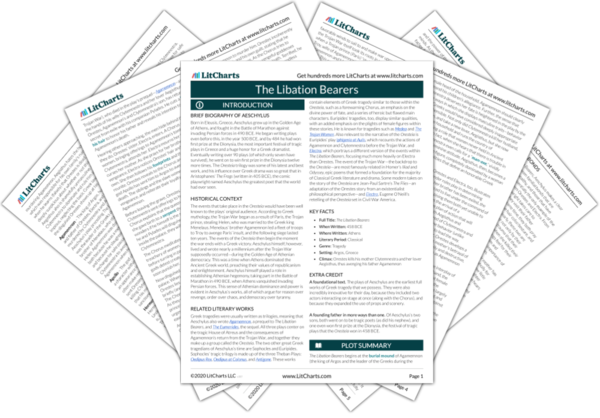Although no gods appear within The Libation Bearers, Aeschylus makes clear that ideas of piety and the power of the gods are in the forefront of his characters’ minds. As the play opens, Orestes visits the burial mound of his father Agamemnon and offers a lock of his hair to his father’s spirit and to the gods, especially to Hermes, who guides the dead to the underworld. As the play moves forward, we witness Electra taking offerings to Agamemnon’s grave as well, a clear symbol of her devotion and piety. In contrast, we are told, the siblings’ mother Clytemnestra (who killed Agamemnon with the help of her lover Aegisthus) shows such piety only when she is troubled with nightmares about her crime.
The theme of the power of the gods, and their control over human destiny, expands as we (along with Electra and the Chorus) learn that Orestes has returned to his home country at the command of the god Apollo, who has ordered him to kill the faithless Clytemnestra and Aegisthus. Since Apollo is the god of prophecy, he is closely associated with the idea of fate. Orestes assumes, as do Electra and the Chorus, that if Apollo sanctions this action, then it is inevitable—that is, Apollo’s will and fate are essentially one and the same.
As the play progresses, we see lack of piety exemplified in the character of Aegisthus. Although he should welcome the disguised Orestes as a guest (hospitality was one of the most important values of the Ancient Greek world), he instead forces the traveller to knock three times at his gate before being allowed to enter. Then, after being told that Orestes is dead, he does not even pretend to mourn—yet another sign of his impiety and lack of respect for essential Greek values.
Throughout The Libation Bearers, the Chorus makes certain that we, the audience, understand that the gods are watching (and to a large extent controlling) the actions that we are seeing onstage. Multiple times they remind us of the gods’ power and omnipresence, and the Chorus’s displays of piety are echoed by Orestes and Electra, who often praise or pray to Hermes, Zeus, Apollo, or even Mother Earth as they plot against their mother Clytemnestra, whose impiety led her to kill their father.
The play attempts to make clear that those who revere and respect the gods (Orestes, Electra, and the Chorus) will triumph, while those who go against the gods’ edicts (Clytemnestra and Aegisthus) will be punished. Yet during the last moments of the play, this issue grows more complicated: in killing his mother, Orestes has himself committed an impious act. Even though he acted in accordance to the wishes of Apollo—thus essentially believing his actions to be inevitable—he is now going to be punished by a different set of gods—the Furies—for raising his hand against Clytemnestra. This suggests the ways that humans can be doomed by fate, an issue that Aeschylus will explore more fully in the play’s sequel, The Eumenides.
Fate, the Gods, and Piety ThemeTracker

Fate, the Gods, and Piety Quotes in The Libation Bearers
Dear god, let me avenge my father’s murder—fight beside me now with all your might!
What to say when I pour the cup of sorrow?
What kindness, what prayer can touch my father?
Shall I say I bring him love for love, a woman’s
love for her husband? My mother, love from her?
I’ve no taste for that, no words to say
as I run the honeyed oil on father’s tomb.
For our enemies I say,
raise up your avenger, into the light, my father—
kill the killers in return, with justice!
So in the midst of prayers for good I place
this curse for them.
Apollo will never fail me, no,
his tremendous power, his oracle charges me
to see this trial through.
If the serpent came from the same place as I,
and slept in the bands that swaddled me, and its jaws
spread wide for the breast that nursed me into life
and clots stained the milk, mother’s milk,
and she cried in fear and agony—so be it.
As she bred this sign, this violent prodigy
so she dies by violence. I turn serpent,
I kill her. So the vision says.
Slave, the slave!—
where is he? Hear me pounding the gates?
Is there a man inside the house?
For the third time, come out of the halls!
If Aegisthus has them welcome friendly guests.
Clytemnestra: Wait, my son—no respect for this, my child?
The breast you held, drowsing away the hours,
soft gums tugging the milk that made you grow?
Orestes: What will I do, Pylades?—I dread to kill my mother!
Pylades: What of the future? What of the Prophet God Apollo,
the Delphic voice, the faith and oaths we swear?
Make all mankind your enemy, not the gods.
Clytemnestra: Watch out—the hounds of a mother’s curse will hunt you down.
Orestes: But how to escape a father’s if I fail?
I embrace you…you,
My victory, are my guilt, my curse, and still—
Aye, trouble is now,
and trouble still to come.
Where will it end?
Where will it sink to sleep and rest,
this murderous hate,
This Fury?
















